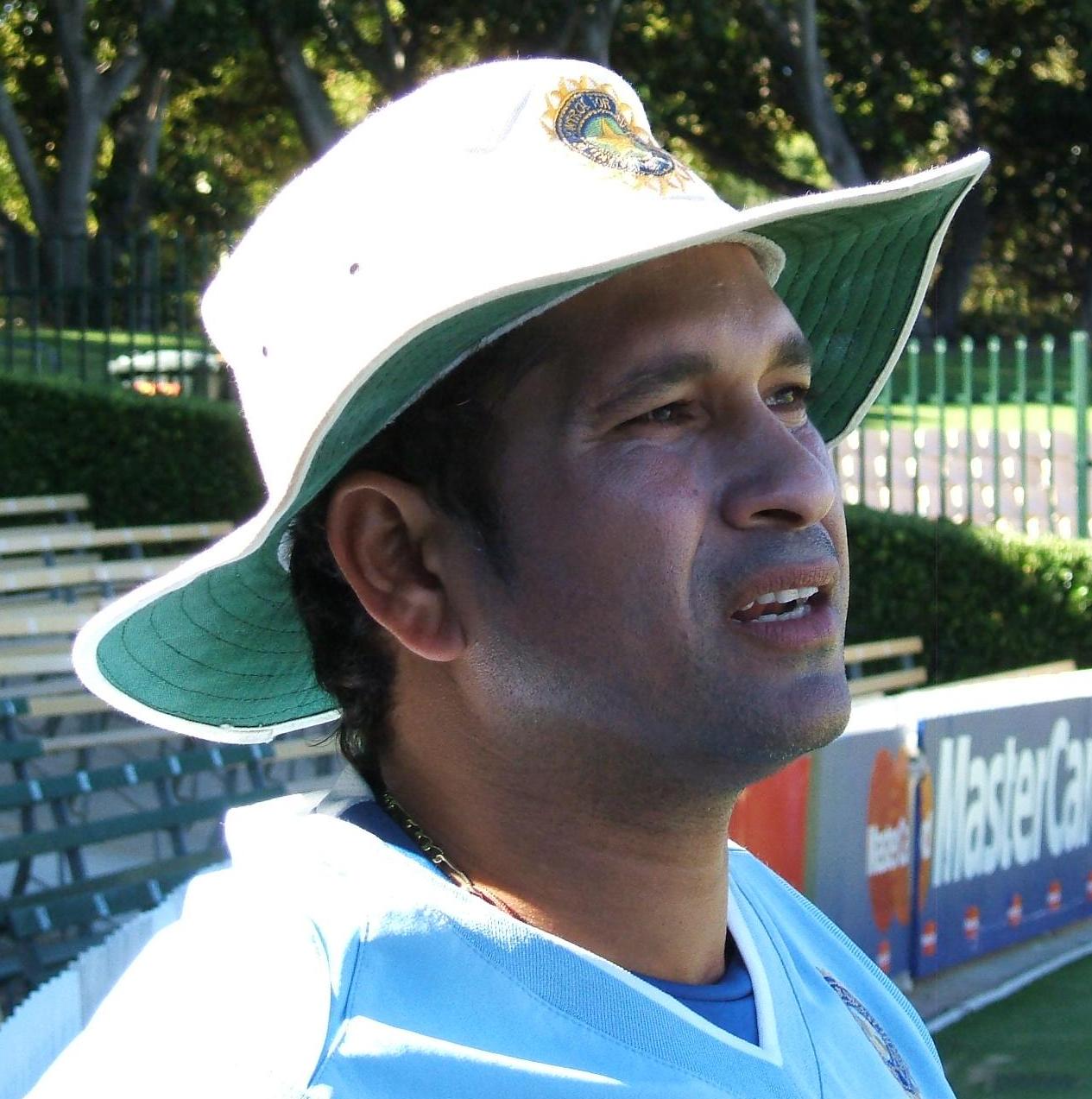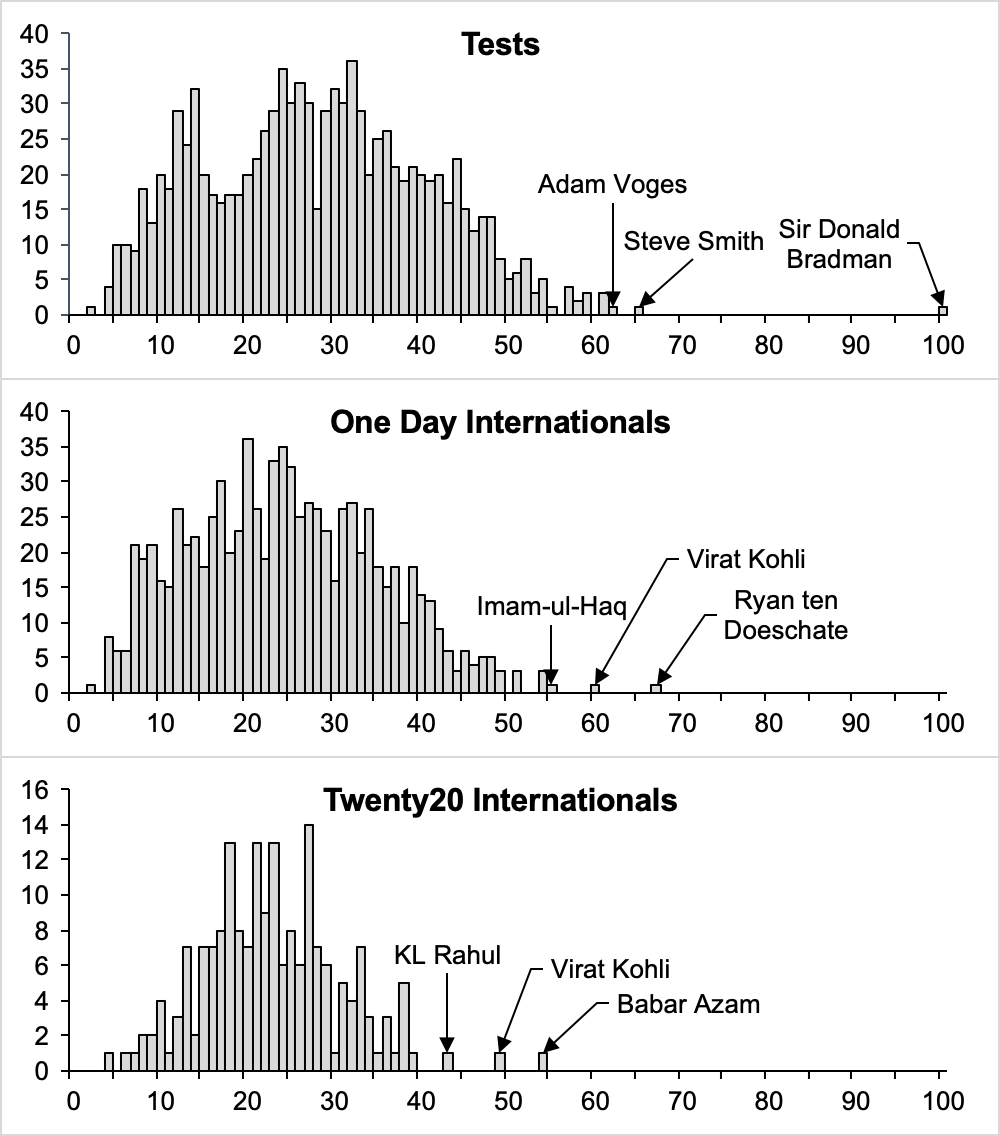|
Aftab Ahmed (1950s Peshawar Cricketer)
Aftab Ahmed (date of birth unknown) was a Pakistani cricketer. Primarily a batsman, all of Aftab's matches at first-class level came for Peshawar, during the 1956–57 and 1957–58 seasons of the Quaid-e-Azam Trophy. He made his debut for the team in December 1956, against Punjab at the Peshawar Club Ground, a match which Peshawar lost by an innings and 169 runs after Fazal Mahmood took 8/21 in the team's first innings. The position in which Aftab batted was irregular; in his first match, he had opened the batting, but in later matches he batted as low as tenth. He played one further match during the 1956–57 season, and three the following season, but rarely made more than single-figure score. His highest score was an innings of 33 runs against Railways in October 1957. Having scored only 51 runs from his eight innings for Peshawar, at an average In ordinary language, an average is a single number taken as representative of a list of numbers, usually the sum of the numbers ... [...More Info...] [...Related Items...] OR: [Wikipedia] [Google] [Baidu] |
Batsman
In cricket, batting is the act or skill of hitting the ball with a bat to score runs and prevent the loss of one's wicket. Any player who is currently batting is, since September 2021, officially referred to as a batter (historically, the terms "batsman" and "batswoman" were used), regardless of whether batting is their particular area of expertise. Batters have to adapt to various conditions when playing on different cricket pitches, especially in different countries - therefore, as well as having outstanding physical batting skills, top-level batters will have quick reflexes, excellent decision-making and be good strategists. During an innings two members of the batting side are on the pitch at any time: the one facing the current delivery from the bowler is called the striker, while the other is the non-striker. When a batter is out, he is replaced by a team-mate. This continues until the end of the innings, which in most cases is when 10 of the team members are out, ... [...More Info...] [...Related Items...] OR: [Wikipedia] [Google] [Baidu] |
Fazal Mahmood
Fazal Mahmood PP, HI (18 February 1927 – 30 May 2005) was a Pakistani international cricketer. He played in 34 Test matches and took 139 wickets at a bowling average of 24.70. The first Pakistani to pass 100 wickets, he reached the landmark in his 22nd match. Fazal played his earliest first-class cricket for Northern India in the Ranji Trophy and strong performances there led to selection for India's inaugural tour of Australia in 1947–48. The independence of Pakistan, prior to the tour led Fazal, a Muslim, to withdraw and choose Pakistan. He played a major role in first gaining Test status for the new nation and then establishing them as a Test match team. He took ten wickets in a Test on four occasions; those against India, England and Australia coming in Pakistan's maiden victories over those teams. Fazal's most memorable performance came on the 1954 tour of England, when he had a leading role as Pakistan won at The Oval to square the series. He took match figure ... [...More Info...] [...Related Items...] OR: [Wikipedia] [Google] [Baidu] |
Peshawar Cricketers
Peshawar (; ps, پېښور ; hnd, ; ; ur, ) is the sixth most populous city in Pakistan, with a population of over 2.3 million. It is situated in the north-west of the country, close to the International border with Afghanistan. It is the capital of the province of Khyber Pakhtunkhwa, where it is the largest city. Peshawar is primarily populated by Pashtuns, who comprise the second-largest ethnic group in the country. Situated in the Valley of Peshawar, a broad area situated east of the historic Khyber Pass, Peshawar's recorded history dates back to at least 539 BCE, making it one of the oldest cities in South Asia. Peshawer is among the oldest continuously inhabited cities of the country. The area encompassing modern-day Peshawar is mentioned in Vedic scriptures; it served as the capital of the Kushan Empire during the rule of Kanishka and was home to the Kanishka Stupa, which was among the tallest buildings in the ancient world. Peshawar was then ruled by the Hephtha ... [...More Info...] [...Related Items...] OR: [Wikipedia] [Google] [Baidu] |
Living People
Related categories * :Year of birth missing (living people) / :Year of birth unknown * :Date of birth missing (living people) / :Date of birth unknown * :Place of birth missing (living people) / :Place of birth unknown * :Year of death missing / :Year of death unknown * :Date of death missing / :Date of death unknown * :Place of death missing / :Place of death unknown * :Missing middle or first names See also * :Dead people * :Template:L, which generates this category or death years, and birth year and sort keys. : {{DEFAULTSORT:Living people 21st-century people People by status ... [...More Info...] [...Related Items...] OR: [Wikipedia] [Google] [Baidu] |
Batting Average (cricket)
In cricket, a player's batting average is the total number of runs they have scored divided by the number of times they have been out, usually given to two decimal places. Since the number of runs a player scores and how often they get out are primarily measures of their own playing ability, and largely independent of their teammates, batting average is a good metric for an individual player's skill as a batter (although the practice of drawing comparisons between players on this basis is not without criticism). The number is also simple to interpret intuitively. If all the batter's innings were completed (i.e. they were out every innings), this is the average number of runs they score per innings. If they did not complete all their innings (i.e. some innings they finished not out), this number is an estimate of the unknown average number of runs they score per innings. Each player normally has several batting averages, with a different figure calculated for each type of matc ... [...More Info...] [...Related Items...] OR: [Wikipedia] [Google] [Baidu] |
Pakistan Railways Cricket Team
Pakistan Railways (usually known simply as Railways) were a Pakistani first-class cricket side who played in the Patron's Trophy and Quaid-i-Azam Trophy from 1953-54 to 1995-96. They were based in the city of Lahore and sponsored by Pakistan Railways. Playing record The team's most successful season came in 1973-74 when they took out both trophies in a side captained by Arif Butt. Other Pakistani internationals in the side included Saleem Pervez and Mohammad Nazir. In December 1964 Railways set a new first-class cricket record for the greatest winning margin in a match. Batting first they made 6 for 910 declared and then bowled their opponents Dera Ismail Khan out for 32 and 27 to win by an innings and 851 runs. In that match Pervez Akhtar made 337 not out, and Ahad Khan Abdul Ahad Khan (born 25 September 1937) is a former Pakistani cricketer. A leg-spin bowler for the Pakistan Railways team, he achieved some remarkable figures in domestic first-class cricket. 1960s ... [...More Info...] [...Related Items...] OR: [Wikipedia] [Google] [Baidu] |
Peshawar Club Ground
The Peshawar Club Ground is a cricket ground in Peshawar, Pakistan, used for one Test match between India and Pakistan in February 1955. It staged first class cricket matches from 1938 to 1987. History of matches The history of first class cricket at the Peshawar Club Ground began with the North West Frontier Province in the Indian Ranji Trophy. With the separation of Pakistan in 1949, the NWFP team was admitted into the Quaid-e-Azam Trophy, and again played at Peshawar until they were replaced in the Trophy by a Peshawar city team in 1956. Before that, in February 1955, Pakistan had entertained India for the only Test match to be played here. In a drawn four-day encounter, Polly Umrigar hit a century for India before he was run out. The following year, New Zealand cricket team, New Zealand played a Governor-General of Pakistan's XI here, while a full-strength Pakistan side beat a non-Test touring team from English cricket team in Pakistan in 1955–56, Marylebone Cricket Club. Fo ... [...More Info...] [...Related Items...] OR: [Wikipedia] [Google] [Baidu] |
Peshawar Cricket Team
The Peshawar cricket team was a Pakistani first-class cricket team from Peshawar. The team's home ground was Arbab Niaz Stadium in Peshawar. The List A and Twenty20 side was known as the Peshawar Panthers. Peshawar first played in first-class competitions in 1956-57, and they have competed in most seasons since then, except for a hiatus between 1977-78 and 1983-84. Apart from a few matches played by North-West Frontier Province in the 1970s, Peshawar were usually the only first-class team from Khyber Pakhtunkhwa province (formerly known as North-West Frontier Province) until the debut of Abbottabad in 2005-06. Peshawar won the Quaid-i-Azam Trophy in 1998-99 and 2004-05 and the ABN-AMRO Cup National One-day Championship in 2006-07. They also won the 2011-12 Quaid-e-Azam Trophy Division Two. In first-class cricket to the end of 2013 they had played 262 matches, with 82 wins, 99 losses, 80 draws and one tie. Their highest individual score is 300 not out, by Shoaib Khan against ... [...More Info...] [...Related Items...] OR: [Wikipedia] [Google] [Baidu] |
Punjab Cricket Team (Pakistan)
The Punjab cricket team was a cricket team representing the Punjab region in Pakistan first-class cricket. Punjab teams played in the Quaid-i-Azam Trophy from its inception in 1953–54 to 1957–58, then in the Pentangular Trophy and Quaid-i-Azam Trophy from 1972–73 to 1978–79, then in the Pentangular Cup The Pentangular Trophy was a first-class cricket competition that was held intermittently in Pakistan between 1973–74 and 2011–12. History The Pentangular Trophy was first contested in 1973–74. From 1977–78 through to 1979–80 it was know ... from 2007–08 to 2011–12. They also won the inaugural 2008–09 Pentangular One Day Cup. Apart from Punjab itself, Punjab A, Punjab B, Punjab Greens and Punjab Whites also contested the Quaid-i-Azam Trophy. Punjab won the Trophy in 1956–57, Punjab A won in 1974–75, and Punjab won the Pentangular Cup in 2011–12. References External links Punjab at CricketArchive Pakistani first-class cricket teams {{Pa ... [...More Info...] [...Related Items...] OR: [Wikipedia] [Google] [Baidu] |
Quaid-e-Azam Trophy
The Quaid-e-Azam Trophy is a domestic first-class cricket competition in Pakistan. With few exceptions, it has been staged annually since it was first played during the 1953–54 season. Domestic cricket in Pakistan has undergone many reorganisations, with the number of teams and matches in the Quaid-e-Azam Trophy changing regularly. Since the 2019–20 season it has been contested by six regional teams, having previously been variously contested by associations or departments, or a combination of the two. History Named after Muhammad Ali Jinnah, the founder of Pakistan, who was known as "Quaid-e-Azam" (Great Leader), the trophy was introduced in the 1953–54 season to help the selectors pick the squad for Pakistan's Test tour of England in 1954. Five regional and two departmental teams competed in the first competition: Bahawalpur, Punjab, Karachi, North-West Frontier Province, Sindh, Combined Services and Pakistan Railways. The Quaid-e-Azam Trophy has been contested by a ... [...More Info...] [...Related Items...] OR: [Wikipedia] [Google] [Baidu] |



